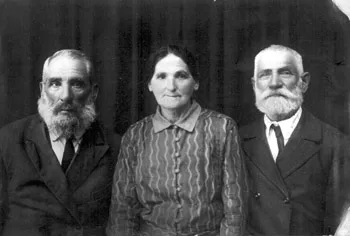Sarra Nikiforenko’s father Shaya Zelyony, mother Enta Zelyonaya and her brother Idl Platkov
My father Shaya Zelyony (on the right), my mother Enta Zelyonaya (in the center), her brother Idl Platkov (on the left). The photo was taken during my mother brother's last visit to Smela in Tuchinskiy Photo shop in Smela in 1928.
My father, Shaya Zelyony was born in 1861. He prayed in his room every evening with his face to the East. He was not to be disturbed at this moment. He went to synagogue every morning, on Saturday and Jewish holidays and undeviatingly observed all Jewish traditions and celebrated holidays. My father got a profession of cabinetmaker when he was very young. He was a very skilled master and became popular.
My mother Enta Platkova was born in Kamenka town near Smela [30 km] in 1865. Since my mother's mother died in 1875 so untimely my mother was responsible for housekeeping. She learned to keep the house from other Jewish women: our neighbors and relatives. Her older brother that studied at cheder taught her to read and write in Yiddish whenever he felt like teaching her.
When my mother turned 16 and it was necessary to find a match for her my grandfather made the rounds of surrounding towns looking for a suitable match. My future father, a young man from a well-to-do family, having a profession, happened to be the most appropriate suitor. My grandfather came to an agreement with my father's parents and returned home to make all wedding arrangements. It was also quite customary for Jewish families that young people never saw each other before wedding. When the bridegroom arrived the bride was covered with a white veil. Four boys were holding posts with a chuppah stretched on them. The rabbi took them around the chuppah, said a prayer and gave them some wine and then the veil was taken off the bride and the husband and wife saw one another for the first time then. They liked each other and made a beautiful couple for the rest of their life. My mother and father settled down in Smela. They rented a room from a Jewish family until my father bought a house.
We spoke only Yiddish in the family, although my father spoke fluent Russian. There were many books at home in a bookcase: they were both religious books in Yiddish and Hebrew since my parents prayed at home. My father said a prayer before each meal and also in the morning and in the evening. My father wasn't fanatically religious. He wanted his children to study successfully, get good professions and work decently. He didn't like chatterboxes involved in a propaganda instead of working. He always told us, children, to stay away from such people.
Our family was well respected by the Jewish, Russian and Ukrainian population. When my father walked in the town men took off their hats to greet him and when my mother came to the market people addressed her as 'Madam Zelyonaya' and sold products on trust to her.
My father was recruited to the tsarist army twice: once it happened during the World War I and another time in Lvov - only I don't remember in what year.
In 1917 when the soviet power was established our family perceived it as liberation and beginning of a quiet life. However, my father didn't put much trust in Bolsheviks since he referred them to big talkers rather than doers. There was order established in the town. A number of new institutions were opened where Jews were getting managerial positions there. There was a popular song 'Who was a nobody will become a man of substance'. Many people were happy. My father didn't get much for his work Our living standards became considerably lower. Nobody needed good furniture. He mainly fixed old furniture in schools, cultural centers and canteens.
In 1931 my parents moved to Baku where my brother Solomon resided. He always said this was a nice and hospitable town and there was always a lot of food. There were no problems with getting a place to live or a job in Baku. There was a big Jewish community and a synagogue in the town.
My mother’s older brother Idl, born in 1860. He owned a store where he sold food products and other inexpensive commodities: dishes, tableware, buckets, bowls, etc. He sometimes visited us in Smela. He was old then. I didn't know anyone of his family, I must have seen them when I was young, but I can't remember. He died in 1932.











